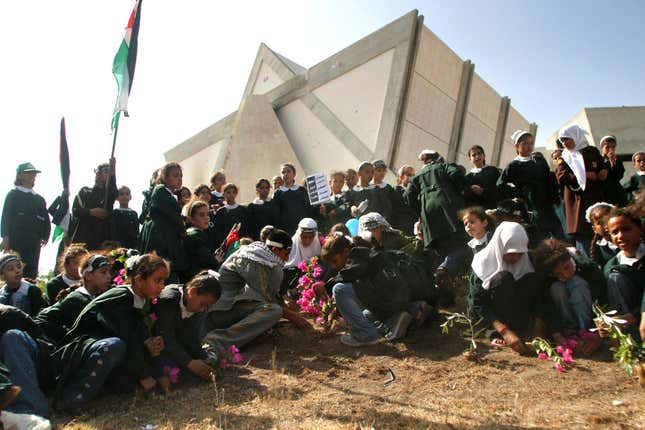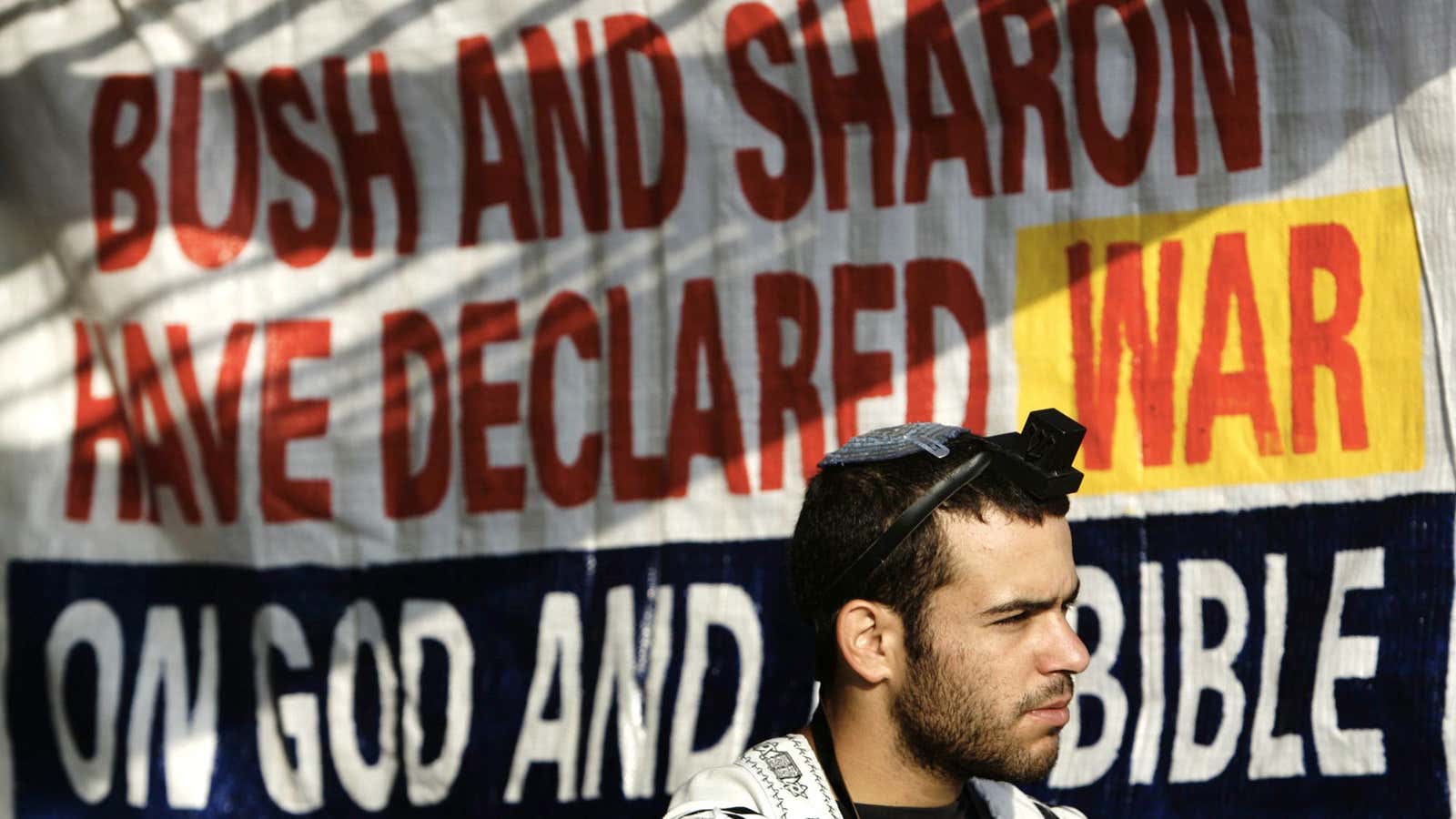Ariel Sharon died yesterday, and his last major political act was to evict my cousins from the Gaza Strip.
When Israel “disengaged” from the Gaza strip in the summer of 2005, I was The Economist’s Jerusalem correspondent, and spent quite a bit of my time reporting on how Israel mistreated Palestinians. Two of my cousins were settlers in Gaza who believed it was part of the land God had promised to the Jews. I was gay, atheist and single; they were strictly religious, married, and had 16 children between them. Aside from our common great-grandfather, we might as well have come from different planets. But they were at the center of the biggest story of the year, I was a journalist, and they were my relatives. So I went to talk to them.
Little Edens
Sharon had always been the settlers’ champion—a hawkish, storied general who, after Israel occupied the West Bank and Gaza in 1967, did everything he could to help the Jewish religious nationalists who wanted to move there. But while they saw settlement as a biblical commandment, for the secular Sharon it was always a strategic one—colonizing the land under Israel’s control to make it more secure. And after the second intifada Sharon decided that Gaza, with its 8,000 Jews surrounded by 1.5 million Palestinians, had become a strategic liability. So to the nationalists’ fury, he ordered the settlers evacuated and the settlements razed.
The settlements felt like a bubble outside of normal space and time. After the two-hour drive from Jerusalem—past featureless, low-rise towns and service stations that felt a lot like middle America—I went through the Kissufim army checkpoint reserved for settlers and their visitors. Gaza is largely flat, and as I drove in I could see little other than the dusty road ahead and barbed wire on either side.
Then the road rose on to a low bridge, and suddenly almost all of the central Gaza strip hove into view. In the near distance was wasteland that the army had cleared of Palestinian inhabitants to create a buffer zone. All that remained were the shells of a few abandoned houses speckled with bullet holes. Further off, Gaza City itself, a grey anthill of boxy, half-finished concrete buildings, shimmered in the heat.
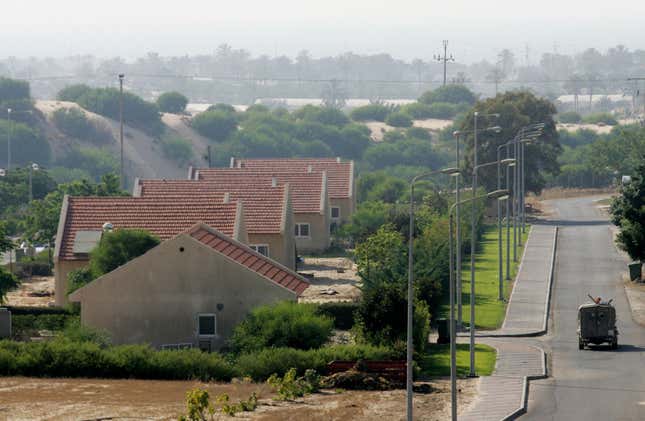
The bridge curved and descended, the wasteland vanished, and I dropped into a gaggle of little Edens. Gush Katif, the main settlement bloc, was a network of communities ranging in population from a couple of thousand to a few dozen. Large houses with sloping red-tiled roofs nestled among lawns, palms, fruit trees and flowering bushes. Cars moved sedately along the streets, children walked without adults, and drivers and pedestrians waved and smiled at each other; it was like some film about the golden age of American suburbia. Grassy embankments around some settlements kept the Palestinians and their impoverished scrubland hidden from view. Unlike in the hilly West Bank, where Jews and Arabs can often see each others’ homes across the valleys, here it was possible to forget the Palestinians even existed.
It was this idyll, not ideology, that kept the settlers there. Religious Zionists didn’t even agree on whether Gaza was part of God’s original zoning plan for the Holy Land, Gideon Aran, a sociologist at the Hebrew University of Jerusalem, told me. What Gush Katif meant to them was largely something more practical: a tranquil, self-contained community with big houses, shared values and great education for their kids, as opposed to an Israel “of unemployment, dirty roads, high taxes, bad services, [and] road rage,” Aran said. He continued: “They’re not just surrounded by one and a half million Palestinians, but absolutely isolated and protected. And to give up on this land is to return to be a rank-and-file citizen, in a stinking political and civic reality.”
Still, there was a religious subtext to the settlers’ view of themselves. They frequently described Gush Katif in Hebrew as a gan eden, a Garden of Eden. They talked about “waiting for a miracle” to save them. And instead of hitnatkut, or ”disengagement”—the antiseptic, Orwellian term coined by the government and adopted by the media—they called their impending departure a girush, “banishment,” a biblically charged word reminiscent of the flight of Adam and Eve. Except that, unlike Adam and Eve, they believed they had committed no sin.
An army of children
I agonized over what gifts to bring my cousins. They read only religious books. Toys for the children would have to be vetted for appropriateness, and besides, there were so many of them. Even food or wine would be tricky; since Judaism has no formal hierarchy like the church, one way rabbis establish their authority is by issuing their own rulings on minute points of Jewish law, so a cake or bottle bearing a hekhsher, a kosher certificate, from one rabbinic court might be rejected by the followers of another. The best suggestion I could get, after making phone calls to various other family members, was to bring fresh fruit, which of course enjoys a hekhsher from the Almighty Himself. Before leaving Jerusalem I had bought several pounds of grapes and mangoes.
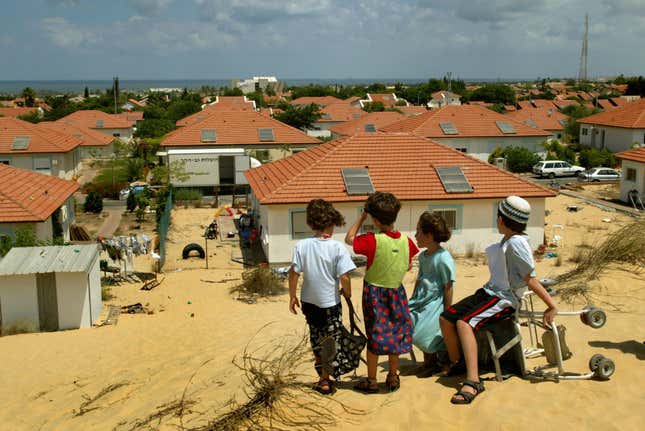
These turned out to be a good choice. Yael, the wife of my cousin Bnaya, was rushed off her feet and glad of something to be able to give visitors. They lived in a house in the largest settlement, Neve Dekalim, that was mean and spartan by Gush Katif standards, with their seven children crowded two and three to a room. The furniture and decorations were all minimal, and Yael dished up meals of tinned food on disposable plastic plates.
The ice broke quickly. The young children were a delightful and unruly bunch, who after a few stares were climbing all over me. The eldest son, six-year-old Naftali—named after his deceased great-grandfather, my great-uncle—was boisterous, mischievous and opinionated, bouncing on the furniture and talking non-stop.
As Yael and I discussed the disengagement—I used their word for it, girush—Naftali butted in, displaying his grasp of the settlers’ political arguments against it. “If they make us leave the terror will only get worse because they’ll fire rockets at all the other towns near here,” he said. Then he took me outside to show me where a Qassam rocket or a mortar shell had fallen a few days before, just across the street from their house. It was a pockmark in the tarmac, the size of a couple of fists. Had it not been for the shattered rear window of a van next to it, it could have been a small pothole.
A little later my other cousin, Bnaya’s sister Yifat, came by. Still in her 30s after bearing nine children, Yifat was trim and energetic, and carried herself with a steely determination. With her was one of her daughters, Moriah, a 12-year-old who combined her mother’s iron will with the fierceness of youth. Yifat recounted how Moriah had recently appeared on television, facing off against Israeli soldiers and police. “She was standing in front of a line of policewomen,” Yifat said, “and she said, ‘Which one of you is going to take me away? You? Or you? Or you?’ And the commentators in the studio were asking, ‘What kind of person could bring up a child to talk to soldiers that way?’”
She fell silent, leaving the answer to the question proudly unstated. Moriah, in a surprisingly deep voice, broke the silence. “One of the soldiers said to his commander, ‘I can’t do anything, she’s bigger than me.’”
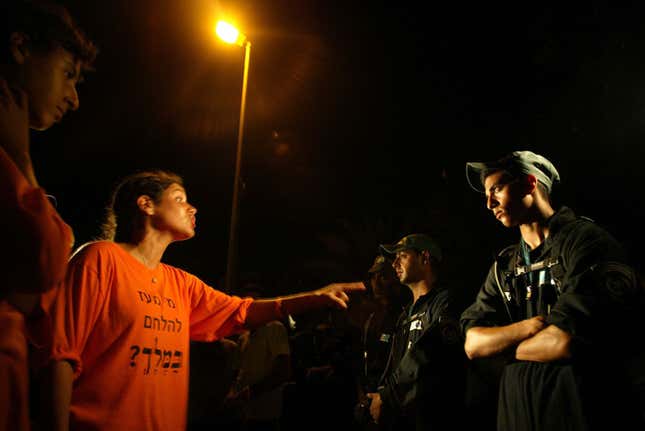
Much later I read the journals of Rachel Corrie, a young American pro-Palestinian activist. An Israeli bulldozer killed Corrie in 2003, as she protested house demolitions in Gaza. The voice in her writing reminded me of Moriah. Both of them burned with a sense of natural justice and a preternatural certainty about what had to be done. Had they been the same age, they would have been deadly but worthy enemies.
Waiting for a miracle
Later my cousin Bnaya appeared. I had probably not seen him since my teens. What I remembered as a boyish young man had grown into a paterfamilias with a respectable beard, an incipient cragginess in his features, and a hunched stance that bespoke a deep tiredness.
He was also clearly more worried than his sister and her hard-boiled daughter. When I had asked Yifat whether she thought the girush would happen, she had said “I’m waiting for a miracle,” with an invisible shrug, the way she might have said she was waiting for a bus. Bnaya too told me he was waiting for a miracle, but went on, “I don’t know where it will come from, but that’s what we’re waiting for.” He gave a small, apologetic laugh.
Yet he became more animated when he talked about what might come afterwards. The disengagement would mean a re-engagement with the country from which they had been living apart for so long. The people of Israel had forgotten their values; there was work to be done. A movement was already under way to set up religious-Zionist kernels in the more secular Israeli towns, to reach out to and educate the neighbors. Having spent decades building settlements among the Arabs, it was time to establish them among the Jews.
I had wondered how people who talked about “waiting for a miracle” could keep their faith if there wasn’t one. Now, talking to Bnaya, I started to understand. If God didn’t preserve their little Eden, it wouldn’t be a betrayal. Rather, it would mean that He was entrusting the settlers with a new mission: to return and rescue their fellow Jews from their slide into the secular abyss. The settlers would not see themselves as victims, but as heroes.
That right there is the meaning of providence: the ability to see a good reason for everything that happens. It’s why religion is so appealing, and why a small minority of religious Zionists has been able to lead the rest of Israel into its disastrous settlement enterprise. Nothing keeps you motivated like the ability to see every setback as a victory.
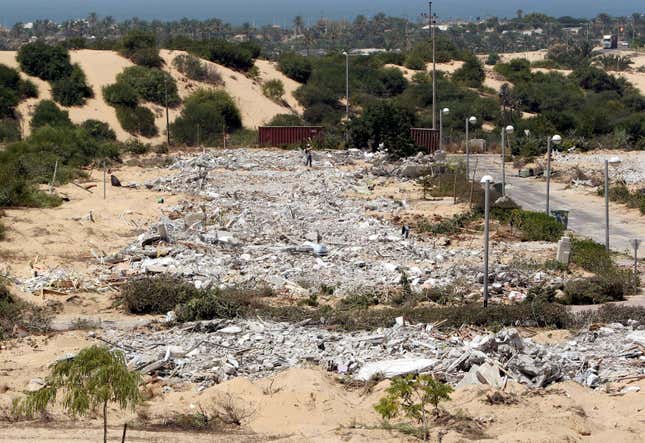
Bringing Torah to the people
There was no miracle. The Gaza settlers were evacuated—some pulled from houses screaming and clawing, others walking out in silent dignity with children in their arms and tears running down their cheeks. My cousins went quietly, dispersing to temporary townships with small prefabricated houses before they found more permanent homes.
But in some of the settlers’ eyes, at least, God did intervene. Ariel Sharon, the man who had sold them down the river, suffered a massive stroke in January 2006, five months after the gates of Kissufim checkpoint had been locked for the last time. He never woke from coma.
Yesterday, a few hours after Sharon’s death, I reached Bnaya on his mobile phone. He was celebrating the end of the sabbath with his family, and he had to step outside to hear me over the shouts and laughter. He and Yael have had five more children since they left Gush Katif; impish little Naftali, Bnaya told me, is now a strapping 15-year-old. They live in Ashdod, an Israeli seaside town roughly halfway between Tel Aviv and Gaza City. It has always been a place of immigrants, populated by Jews first from Morocco and Egypt, then the former Soviet Union, then Ethiopia and India. The Gush Katif exiles are just the latest wave of strange newcomers.
The Neve Dekalim yeshiva where Bnaya taught has moved there too, and it is doing what he said it would do: Trying to bridge the gap between the religious and the secular. “I don’t want to be an arrogant person who tells other people what to do, but there is a weight of knowledge and Torah that one who carries it has a duty to bring to others who don’t have it,” he told me. The disengagement, he said, ”was something terrible and unforgiveable but… the people of Israel have profited from the disengagement because of this connection between people.”
He was using the word hitnatkut now, instead of girush. I wondered whether his feelings about Sharon had softened. ”What would you say to Arik Sharon, if he were still alive and you could talk to him?” I asked.
“Wow,” Bnaya exhaled.
“That’s a lot,” I apologized.
“Yes, that’s a lot.” He went silent for a while. I waited, imagining him standing at the door of his home with the noises of his family drifting through it, processing the last nine years.
Finally, he spoke. “I would say that he owes a lot of debts to the people of Israel… and that when he leaves this world, in order to leave it whole, he should repent and return Gush Katif to the people of Israel and compensate all its inhabitants for the crime.”
And would Bnaya go back to Gush Katif if that happened?
“No,” he said. “I see my mission as being here, with the general public. Unless they were to build Gush Katif differently, as a place for all of Israel and Israelis. Then I’d be the first to go back there.”
That’s the lesson Bnaya took from Gaza: That the settlers allowed themselves to get too comfortable and too detached from the rest of Israel. Now they’re back in the heartland, winning other people over to the cause. Many people saw the Gaza pullout at the time as a body blow to Israel’s settler movement. If what happened to my cousins is any indication, Ariel Sharon’s legacy may have been to strengthen it instead.
